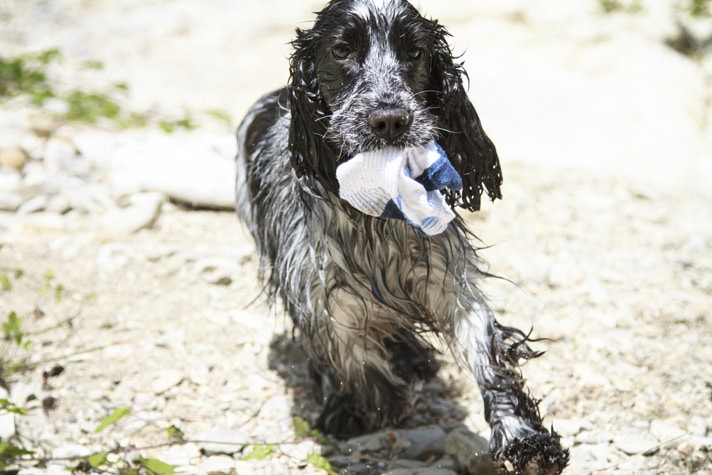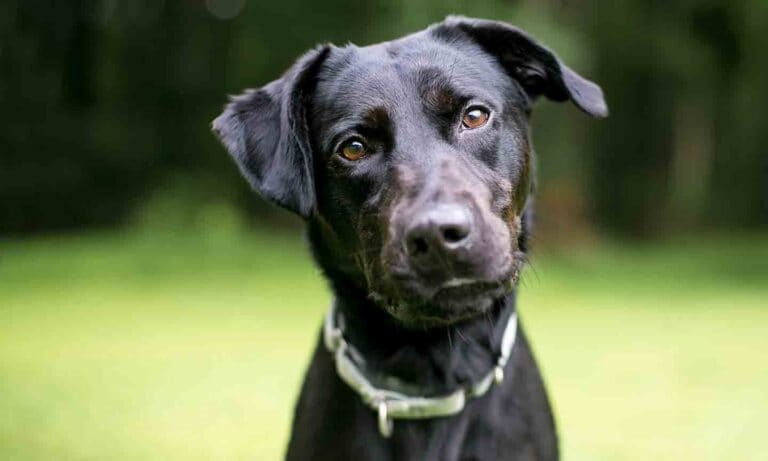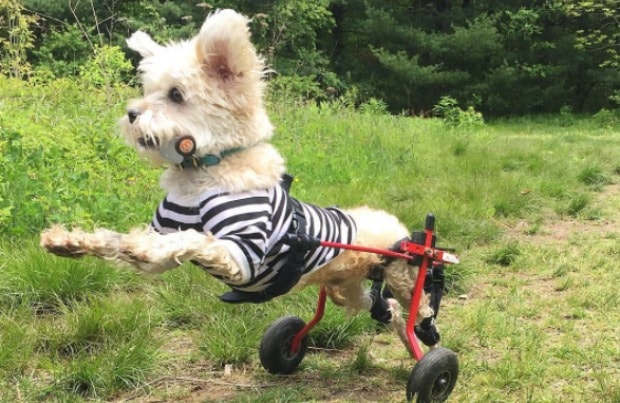Think of your adolescent dog as a teenager–a teenager with lots of energy, enthusiasm and not much control or common sense. With that image in mind, you can see why adolescent dogs are the age most prone to ingesting foreign bodies.
Unfortunately, by the time adolescence hits, you have started to believe that your dog is “safe.” Your wonderful puppy now knows some basic obedience and is housebroken. Then adolescence hits. Suddenly, and often this is very suddenly, your perfect puppy has become “the young dog from the wrong side of the tracks.” If he is a large or giant breed, he is stealing things off the counter or dinner table. If you have a small or toy sized dog, he is sneaking things out from under the bed. Things you really would not have thought were attractive or even chewable are hit with the tooth marks of your medium-sized canine family member. And some items are actually being consumed!
Most dogs explore new things face first. They sniff and might paw something carefully with a foot. Next, they take the item of curiosity into their mouths. If it has food smells on it, smells like you or if the dog gets startled, the item may get swallowed. Some things, like socks, might get chewed or sucked on and then swallowed. Occasionally something will be swallowed by accident when your dog is retrieving or going to catch something you threw.
What Are Foreign Bodies And Where Do They Come From?
A foreign body is anything your dog ingests that does not belong inside a dog. The items can range from rocks to socks and everything in between. While some may “pass through” without incident, others require veterinary interaction to keep your dog healthy. Adolescent dogs of all sizes tend to lead the foreign body surgery counts.
Some of the most common foreign bodies are rocks, toys, socks and coins. All of these have the potential to cause an obstruction, and coins can leach toxic heavy metals into your young dog’s system that cause poisoning.
Your dog’s mouth and esophagus are both able to handle bigger items than your dog’s intestines. Fairly large objects may be swallowed and end up in the stomach–where they stay. Some are able to get into the intestines. A few of these objects, if they are soft enough or small enough, may pass on through and come out in the stool. Many others get stuck somewhere along the intestinal tract. While a sock may pass through a Great Dane, it will certainly get stuck in a Bichon Frise.
Signs Your Young Dog Ate Something He Shouldn’t
Generally the first thing families will notice if their dog ate a foreign body is vomiting. If you are lucky, your dog will vomit up whatever crazy thing he ate. If not, you may be looking at surgery. Along with vomiting, many dogs will lose their appetite and get dehydrated. They may show abdominal pain and act depressed.
If you notice something missing and your dog is vomiting, definitely contact your veterinarian. Dogs have swallowed some amazing things–including shish kabob skewers! Check out the annual contest for bizarre things pets have swallowed.
Diagnosis And Treatment For Foreign Objects
Your veterinarian will do a physical and then take some radiographs (X-rays). Sometimes a foreign body will be readily evident on the radiograph–such as a rock. Other times a diagnosis will require films taken after a contrast dye has been administered. The dye will outline the foreign object. An ultrasound is another diagnostic tool that might be used.
Once the object has been identified and located, a plan of action will be drawn up. With coins, especially if they are stuck in the stomach, action needs to be taken fairly quickly to prevent toxic metals from leaching out of the money and into your dog’s system. Endoscopy can occasionally be used to remove foreign bodies from the stomach, but be prepared for the chance that your dog may need surgery.
For certain foreign objects, the choice may be made to observe and see if your dog can pass it. Broken, thin glass ornaments may pass if you feed your dog some bread or small cotton balls soaked in meat juice. The bread or cotton balls tend to wrap up the small glass pieces. Many types of glass and shards of bone can cause problems moving through the intestinal tract, however. They can scratch, cut or even pierce intestinal walls, which causes leakage of intestinal contents and an infection called peritonitis.
Some of the most dangerous foreign bodies are string or tinsel. These linear foreign bodies can “pleat” up intestines and do a great deal of damage. Think of pulling on the string around your jacket and how it tugs on the material as it shortens up.
Realistically, you are often faced with a surgery to find and remove the foreign item(s). Surgery will be under general anesthesia. Expect at least a couple of days stay in the hospital as your dog heals the incision. Your veterinarian will want your dog eating and drinking normally before he is released.
Stop The Problem Before It Starts
The best way to deal with foreign bodies is to prevent them. Never encourage your dog to chew on socks, as these are frequently swallowed by young dogs left home alone. Don’t toss rocks for your dog to play with. This includes tossing rocks into a creek or pond for your dog to dive after.
Use dog toys that are the proper size for your dog to decrease the chances of an accidental swallow. A large or giant breed dog can easily gulp down a tennis ball. The soft rubber, squeaky toys that many toy and small dogs love can easily be chewed up, so don’t leave your dog unattended with one.
Put dirty silverware and knives used to cut meat directly into the dishwasher or wash them right away. One of my current young dogs was known as “she who runs with knives,” as she would find knives in the sink (and she is a medium-sized dog, so how she got them is beyond me!) and gleefully run through the house with them. Luckily, no one was ever hurt and she never tried to swallow one, but I had to really enforce the “clean up thoroughly after you do anything with food” rule. After your house is puppy-proofed again, sit back and enjoy your energetic, young dog!
By: Dr. Deb M. Eldredge
Featured Image: via LorenzoPatoia/iStock/Thinkstock
Share:









